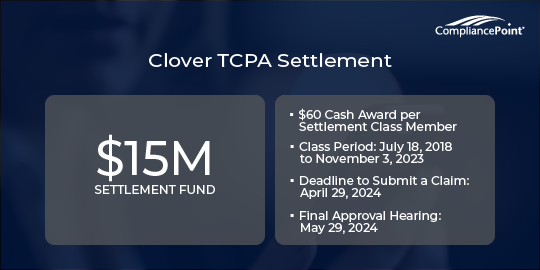Text Messaging Lessons from the Clover TCPA Settlement
Clover Network LLC, the maker of a point-of-sale platform, agreed to pay up to $15,000,000 into a settlement fund for a TCPA class action lawsuit. A Florida plaintiff filed the lawsuit, making the following allegations against Clover:
- Clover bombarded him with telemarketing text messages throughout 2022
- Texting the plaintiff without express consent
- The plaintiff had no existing business relationship with Clover
- Texting the plaintiff’s number that was on the national Do-not-call registry
Clover agreed to pay $60 to each Settlement Class Member as part of the Bobo v Clover Network settlement. People are in the Settlement Class if:
- They were sent more than one text message within any 12-month period from Clover selling its or its customers’ products and services between July 1, 2018 and November 30, 2023
- Their telephone number had been listed on the National Do Not Call Registry for at least thirty days
- They did not have a prior established business relationship with Clover or its customers
Clover identified more than one million people believed to be eligible for the $60 payment. The window to submit a claim form closed on April 29, 2024.
Lessons Learned for Text Messaging Campaigns
The Clover TCPA settlement is another reminder that TCPA rules apply to promotional text messages. Litigation resulting from non-compliant text messages is becoming more common. Here are some text messaging best practices that can reduce your organization’s risk of fines or lawsuits.
Express Written Consent
The TCPA requires organizations to get express written consent before sending automated text messages to numbers on the National Do-not-call list.
Opt-out Language
Organizations must give contacts the ability to opt-out at any time. Text messages need to include an unsubscribe option, such as “Reply STOP to no longer receive texts.” Your system should also recognize additional opt-out words commonly used like, “quit,” “end,” “revoke,” “opt out,” “cancel,” or “unsubscribe.” Honor all opt-out requests immediately and keep an internal do-not-call list.
Record Keeping
Keep detailed and accurate records for opt-ins, written consent, and other permissions. High-quality records will be valuable if your business finds itself the subject of an investigation or lawsuit.
Honor Call Time Restrictions and Attempt Limits
The TCPA requires all marketing calls and texts are made between 8:00 AM and 9:00 PM. Be aware that some states have stricter limits on calling times than the federal law. Some states also limit the number of daily call attempts allowed.
CompliancePoint has a team of marketing compliance professionals who can help your business execute campaigns that are compliant with the TCPA, TSR, Do-not-call rules, and any applicable state laws. Reach out to us at connect@compliancepoint.com to learn more about our services.
Finding a credible expert with the appropriate background, expertise, and credentials can be difficult. CompliancePoint is here to help.






